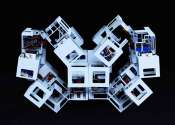As Maui rebuilds, research team contributes expertise on hazard-resilient housing
It has been one year since fires on the Hawaiian island of Maui killed 102 people, destroyed more than 2,200 buildings and displaced 5,000 people in the historic town of Lahaina. Today, signs of rebuilding are visible. The ...
Aug 9, 2024
0
1









